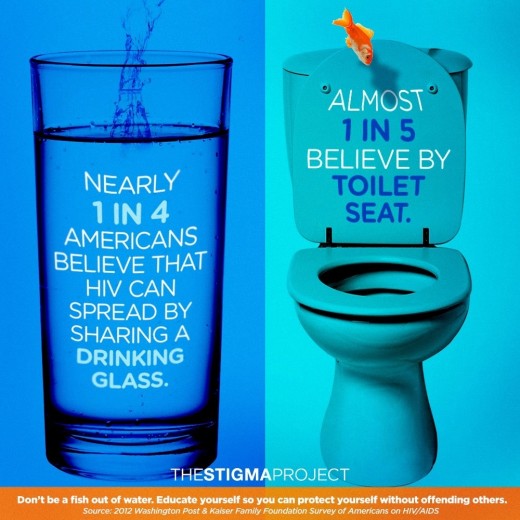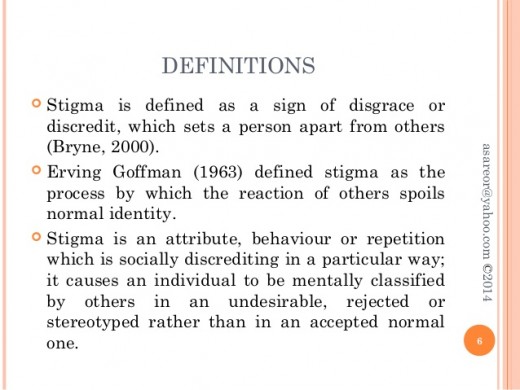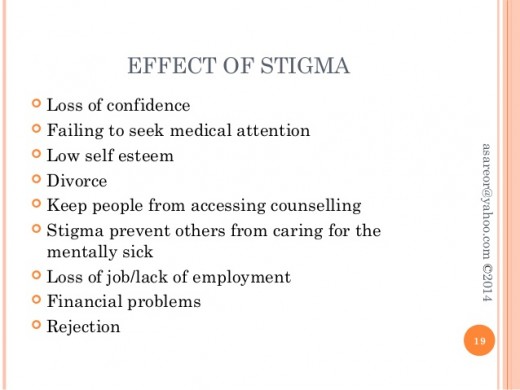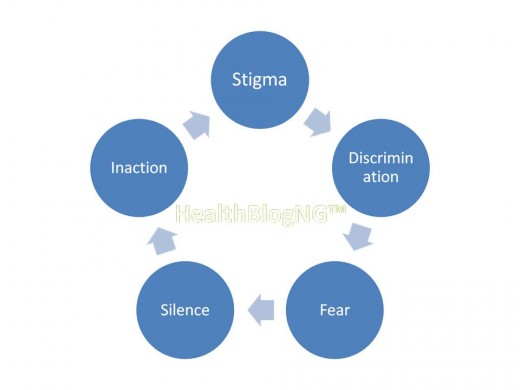How Stigma Spreads H.I.V.

Fighting Stigma
Everyone remembers the Bible story of the woman who was hemorrhaging and she touched Jesus' cloak and was healed. She was a social outcast and shunned by all of society. The question was asked once, "Are we the crowd?" How would you feel if your next door neighbor was H.I.V. positive? How would you feel if your child was playing with another child who was H.I.V. positive? How would it affect you to know that one of your coworkers had the virus? Would you really be behaving differently than the people did in the time of Jesus? Have we as a culture really gotten away from stigma and thinking that the person who has H.I.V. brought the disease upon themselves because of something in which they did or are we still having the same reaction that we did over two thousand years ago?

The Epidemic of the Disease
When the H.I.V. epidemic first came out in the early 1980's, people did not know how it was transmitted. When people came in to a hospital with the disease, aides, nurses, etc., would set a tray of food inside the door of the patient's room and shove it across the room because they were so afraid, they wouldn't even enter the room. It was in 1986 that the test for the H.I.V. virus came out. The Centers for Disease Control knew that it was not transmitted by causal contact like shaking hands or using the same restroom and tried to advocate that. However, it is not uncommon today for E.M.T.'s to show up somewhere an ambulance was called and refuse to care for someone who is H.I.V. infected. It was noted in 2005, at a recuperative care facility, a person with H.I.V. was being treated there who did not need intensive medical care. The staff put a biohazard sign on his door and anyone who entered the room had to have on a hospital gown, gloves, and surgical mask even though they were not in danger of getting the disease just by being in the same room.

Theology of Spread of Disease

Stigma
Anymore, the word "stigma" is in itself a disease. Anybody with a mental health problem, AIDS, drug addiction ( Mental Health), or disease other people do not understand is subjected to a stigma or fear from other people. They are outcasts. People are afraid of them because they are afraid of what they do not understand. These people are just that: they are people living with a terrible disease and need to be treated with compassion not shunned by society and treated as pariahs.
What is Stigma?

The Stigma of H.I.V.
Although people who are infected with H.I.V. can lead a long and mostly healthy life, many people do not stay in treatment or refuse to get treated for the disease all together. They go into depression and often deny that they even have the disease. Sometimes they think that if you ignore the problem, it will go away. If we are going to help people try to combat the disease, people need to not only get tested but fight the stigma surrounding the disease.
Stigma is a Disease

Ryan White
Ryan White was born on December 6, 1971, with hemophilia. He became infected with H.I.V. when given a blood transfusion to treat the hemophilia. Once he was diagnosed with H.I.V., he tried returning to school and 117 parents and 50 teachers all signed a petition to ban him from returning to school. The fear and ignorance of the H.I.V. virus lead to the principal banning him from school. When his family sued, the Indiana Department of Education ruled that he should be allowed to return to school. The Centers for Disease Control notified the Board that Ryan White did not pose a risk of infecting other students. However, people on the street would shout at him, "We know you are a queer." The school required him to eat with disposable utensils, use a separate bathroom, and was treated like a pariah. After a bullet was fired through the window of his home when no one was at the home, his family moved out of the area. He eventually died on April 8, 1990, at the age of 18.
How is H.I.V. Transmitted?
view quiz statisticsStop the Virus
Statistics on HIV
- Over 1.2 million people living in the United States have H.I.V.
- 1 in 8 of the people with H.I.V. do not know that they have it.
- According to the U.S. Centers for Disease Control and Prevention in the year of 2010, the age range of 23 to 34 accounted for 31% of all new infections. The age range of 13 to 24 followed by accounting for 26% of all new infections.
- 25 % of people surveyed living with H.I.V. did not seek treatment for fear of disclosure of their status and or fear of poor treatment according to Global Information and Advice of H.I.V. and A.I.D.'s.
Effects of Stigma


Stigma Spreads the Disease
People form concepts in their head about who they are and life in general. You ask someone, "Do you think that this person gave you H.I.V.?" and the answer is usually, "No. This is a nice person." They do not want to believe that they have H.I.V. and do not want to believe that the people they know have it either. The disease is demonized. So, it was noted by a group of professionals that when getting a group of H.I.V. patients together for a support group, they will say, "I was terrified to go in the building." What terrifies them is not the disease itself but the stigma against it. People do not get tested because they do not want to know they have the disease. Often people who do have the disease will go into a state of denial that they have it. They will not take their medication and possibly die of the disease while also putting other people at risk of contracting the disease because the stigma against the disease is so prevalent, so overwhelming, that they cannot believe that they have it. This is how the stigma helps spread the disease. The diagnosis in and of itself is a disease.
Hate the Disease Not the Diseased
Fighting the Spread of Disease









